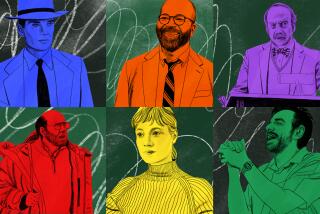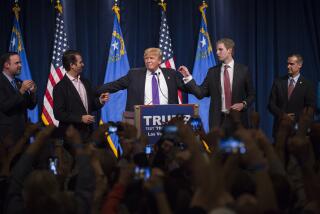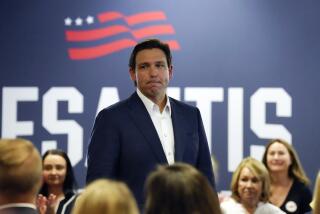Adding a Slice of Life to the Three Rs : Responsibility, Honesty Are Stars of New Character Education
The word “responsibility” jumps out in big black letters from the bright yellow background of a poster by the door in Randy Robinson’s geography class.
An adjacent poster lists, staccato-style, key definitions for the word: moral, legal or mental accountability; trustworthiness.
Tacked onto a board between the two: a Time magazine cover of Marine Corps Lt. Col. Oliver North.
The visual display will remain for the entire month as a stimulus for Robinson’s five classes at El Cajon Valley High School to consider what “responsibility” means, in all of its meanings and nuances. From time to time, Robinson will prod his ninth-graders to consider the term within their daily assignments, from how students and politicians should accept accountability for errors to the way drugs and alcohol can reflect irresponsible behavior and damage academic performance.
‘Character Education’
In similar ways, all teachers in all subjects at the 10 high schools in East County’s Grossmont Union District will be attempting to impress the “responsibility” ethic on their charges in October. And in succeeding months, class discussions will feature the values of self-esteem, tolerance, discipline, respect and others felt, by district officials, to be key to the functioning of American society.
The efforts result from unanimous action last spring by Grossmont’s school board to set up “character education.” The program began last month with consideration of “honesty.” Students in one English class wrote essays on whether they would ever commit perjury to protect a friend.
“There is just so much of the United States concerned that we have lost our old-time values, so we’re very pleased to be able to implement this kind of thing,” said board member Don Hunsaker, a biology professor at San Diego State University.
“It gives us a chance to bring into the education of young people a lot of values that we feel everybody, regardless of religion or liberal or conservative, can agree upon. Students do need to think about these things more in their formative years.”
Community Commitment
Grossmont is the only district within San Diego County pursuing a formal “character education” program, a fact which the district’s associate superintendent for educational programs says reflects a strong commitment to the community.
“We’re saying to the community that we are not afraid to take a stand in character areas,” Robert King said. “The idea of teaching values can be volatile, but we believe we have an obligation to do so.”
He added: “The public perceives that we have overlooked our responsibilities in this area . . . although I believe that teachers every day do promote ethical behavior as role models. But perception becomes reality whether true or not. So we are adding a clear focus (with this program) to show that we understand our role.”
The notion of character education is being debated at the national level as well. “There is a public hunger for schools to deal with morality,” Chester E. Finn Jr., an assistant secretary of research in the U.S. Department of Education, said at a conference on the topic in Washington last week.
But conference participants reached no consensus on the best way to carry out such a curriculum, disagreeing over the relative importance of parental responsibility, religion, community standards and historical development of moral guidelines.
Similar Program in Fresno
In an interview, Grossmont’s King said the district had considered an ethics curriculum for more than three years, but always stumbled on the question of how to integrate it into normal classroom teaching. But last year, teachers from El Cajon Valley visited a high school in Fresno where character education has been taught for several years.
“I’m going to be honest . . . ,” said El Cajon Valley Principal Art Pegas. “We stole the idea of how to teach values from (Fresno) . . . but the next best thing to your own idea is to know what idea to borrow.”
Upon their return, El Cajon Valley’s teachers drew up a list of the 10 values they considered most important to teach. Grossmont’s board adopted the list and decided to extend the program to all the district’s schools. Each month’s topic is featured in a special newsletter to all teachers, with suggestions on how to incorporate the value into various curriculums.
“We’ve made this a targeted, focused goal so that it’s not just the gifted teacher trying to impart values and feeling that he or she is a voice in the wilderness,” Pegas said.
For example, coaches were invited to talk with their classes on honesty in competition and how they would handle examples of cheating to gain an edge, such as this season’s revelation of scuffed balls and corked bats in major-league baseball. Many teachers provoked their classes to think in personal terms.
Presenting Ideas
But in no case are teachers required, or even encouraged, to come right out and “tell” students what is morally correct or incorrect, Principal Pegas said.
“There is what I believe a difference between propaganda and education,” Pegas said. “Propaganda means, ‘This is the truth, this the one side,’ whereas education means bringing in as many different sides as possible.
“Character education is important and we ought to be discussing these concepts, but the fine line is between telling the kid and guiding the kid toward a conclusion, and that is where the gifted educator comes in.”
Pegas said that public schools have a difficult task because of their responsibility to handle all of society’s children.
“Say a teacher tells students that premarital sex is not morally correct,” Pegas said. “But half the class may have a (divorced) mother or father who might be living with (his or her) girlfriend or boyfriend, so the student may feel a personal condemnation from the teacher.
Guiding Students
“There are right answers but no easy way to guide the kids to them . . . especially when they can pick up a paper every day and are greeted with every form of dishonesty and problem in society.
“On Wall Street, we’ve got people dealing cocaine, we’ve got political leaders whose morals are contemptible, we’ve got ministers who lie . . . “
Added Pegas: “That’s real life. We present a balance. Honesty is an absolute, a desirable thing that we can all agree upon. But there are the relatives that people consider all the time. What do you do if you have the answers to tomorrow’s test? Do you use them? Do you tell someone?”
Geography teacher Robinson said that he hopes, over the course of the school year, his repeated questioning and challenging of students will lead them to understand the right way of acting on moral decisions.
“Say you’re riding home with a friend after a dance and he’s a little bit careless and scrapes a car parked on the street,” Robinson asked his geography class. “Are you going to stop and leave a note or will you jam?”
The responses varied widely.
“I’d wait to see if any witnesses were around,” one student said. But a second protested, “I’d be (upset) if it were my car that was hit.” Added a third, “It would depend on whether I could pay for (the damages) . . . if it were a Ferrari, it would cost way too much to fix. So then I wouldn’t stop.”
Handling Conscience
Robinson then asked how the students would handle guilt feelings if they failed to leave a note. “What goes on in your soul, in your head? Unless you have no conscience at all?”
One student told the class of taking $100 from his parents several months ago without them noticing, but eventually he felt so bad about the theft that he confessed and paid his parents back with money given him as a birthday present.
“I walked out of that discussion feeling good that the students were beginning to pick up on the fact that morally it would be wrong to run,” Robinson said. “All I can do is expose them to the legally and ethically correct side and hope that what they hear from me will not be negated by what actually happens outside the class or at home.
“I think that many of the kids do know the right thing and the wrong thing. But you want them to talk in class, to say how they feel, to be comfortable in discussing their feelings.”
Robinson said the picture of Ollie North tacked to the posters is a special stimulus this month for his classes to consider how general concepts are applied to individual cases.
“There are people who feel that he was a hero and people who feel he was anything but,” Robinson said. “I want my ninth-graders to think about that and draw their conclusions.”
Will the program make a difference?
“It’s not going to save the world,” Pegas said.
“But there is an absolute consensus among parents, teachers and even students that this cannot hurt. Also, these values are not just a (philosophical) exercise. They relate to good job skills as well.
“And I think there is a general consensus that the program will result in people trying to display a different, more positive side.”
More to Read
Sign up for Essential California
The most important California stories and recommendations in your inbox every morning.
You may occasionally receive promotional content from the Los Angeles Times.









